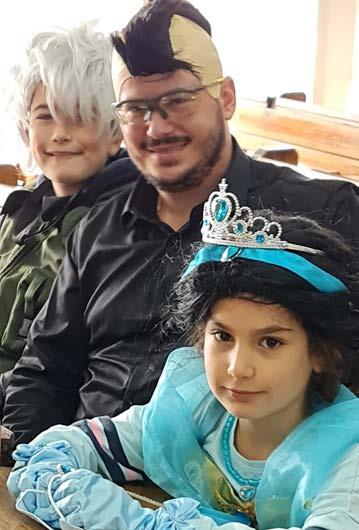
3 minute read
by Rabbi Michael Plaskow MBE
Do Not Curse The Deaf
by Rabbi Michael Plaskow MBE former Chaplain to the Jewish Deaf Association in London
Advertisement
Society’s behaviour towards the deaf is very odd when compared with its behaviour towards the blind, and this oddity is reflected in the words of the Torah.
The verse in םישודק Leviticus 19:14 reads; “Do not curse the deaf and do not put in front of the blind something that he might stumble over...” There are two directives here. It is well-established that a “stumbling block” is not only a physical entity, i.e. a stone upon which someone could trip, but an abstract entity also, i.e. making it possible for someone else to violate the halacha. The halachic ramifications of this abstract aspect are many and well-documented. The prohibition against cursing the deaf has similar halachic substance and the two directives are similar in this sense. But they are dramatically unequal in the manner each directive is expressed. Concerning the blind, one is adjured from causing minor mishap, a stumble; concerning the deaf one is commanded not to curse them.
Society makes provisions for the blind; it treats them as normal people who are sadly afflicted. The deaf, on the other hand, are not always treated as being normal people. Frequently, they are dealt with as if they were somewhat less than human. Persons who find themselves unable to easily communicate with a deaf individual will often deny to themselves that there exists a human being and they will ignore him, moving on to the next person. This voiding of the deaf person’s worth is included in the commandment not to curse the deaf. The Hebrew word for “curse” is derived from a root which means “to make light of”.
Thus one is enjoined not to bring about minor harm to the blind, for that is all a person’s bad nature may incite him to. But one is commanded concerning the deaf with vehemence, “Do not curse”, because society is fully capable of cursing the deaf and negating their intrinsic human worth.
Deafness knows no boundaries. It affects all ages and all communities
cutting off the principle lines of learning and communication. This has profound implications as regards speech, education and social contact. Deafness suddenly inflicted or contracted in the prime of life can place enormous strains on families and relationships. A hearing loss can make a person seem isolated, irritable and indifferent.
Deafness has menacing implications for Jews. A deaf Jew who wishes to pursue the aspirations of his soul will find that a wall of silence obstructs him from his spirituality. The pleasures which the hearing world take for granted are denied him. Normal conversation, shofar blowing, zemirot, hearing a Rav give a shiur or a Chazan davening are totally inaccessible.
We must seek to reach out to hearing parents of deaf children and encourage their participation in Jewish life from a very early age. It would also encourage parent-child communication within the family situation. Let me give an example how this can be put into operation. Would it not be a wonderful idea for each community to seek out a deaf family or a hearing family with deaf children? Let them observe our rich treasury of visual symbols either on Shabbat or other occasions such as the Succah, lighting the menorah or at
a seder. I am positive that this is the answer to the usual questions such as how we can serve the deaf Jew who may be isolated in a hearing community. Or, to put it another way, how can we help to alleviate the feelings of loneliness and religious exclusion? Some time ago, the Beth Din of London completed its consideration of halachic and technical aspects for the use of “Loop Systems” on Shabbat and Yamim Tovim to help the hard of hearing to follow synagogue services. Subject to the conditions issued by the London Beth Din, it is permissible to install loop systems in synagogues and elsewhere and also to permit the use of modified hearing aids on Shabbat and Yamim Tovim. I had the Or, to put it another way, how can we help to alleviate the feelings of loneliness and religious exclusion. great pleasure in co-operating with the London Beth Din in these matters in my capacity as Chaplain from 1985 to 2000. I was also happy to converse with these wonderful people in sign language. Let us always remember that the absence of a deaf person’s Torah is the absence of that deaf person’s Judaism. Thus, the problem of how to provide







